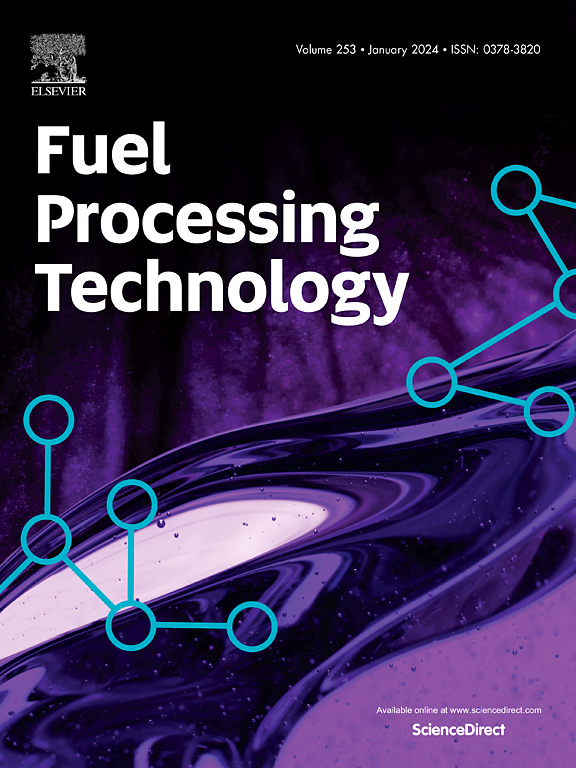正辛醇和乙醚增强甲醇/喷射A-1共混物在稀预混燃烧器中的溶解度和燃烧特性
IF 7.7
2区 工程技术
Q1 CHEMISTRY, APPLIED
引用次数: 0
摘要
本研究以正辛醇和乙醚(DEE)作为助溶剂和助燃剂,在稀预混预汽化(LPP)燃烧系统中,研究甲醇和含水甲醇与Jet a -1燃料混合后的稳定性和燃烧特性。在10,20和30℃的环境温度下进行了相稳定性研究,表明正辛醇有效地稳定了甲醇- jet A-1混合物。在30℃的温度下实现了优异的混相。两种混合物JMOD1 (80% Jet a -1 + 5%甲醇+ 10%辛醇+ 5% DEE体积分数)和JMOD2 (75% Jet a -1 + 10%甲醇+ 10%辛醇+ 5% DEE)随后在LPP燃烧室中与纯Jet a -1 (J100)作为参考燃料进行了评估。结果表明,与J100相比,JMOD混合物具有更一致的火焰模式,更低的峰值温度和更少的壁面热点。这种增强是由于甲醇、乙醚和正辛醇中氧含量的增加,而正辛醇具有阻燃性能。JMOD共混物具有显著的降低火焰峰值温度和改善燃烧均匀性的能力。研究结果支持甲醇混合物作为燃气轮机替代燃料的可行性。本文章由计算机程序翻译,如有差异,请以英文原文为准。

Solubility and combustion characterization of methanol/jet A-1 blends enhanced with n-octanol and diethyl ether in lean prevaporized premixed burner
This study investigates the stability of mixtures and combustion characteristics of methanol and hydrous methanol blended with Jet A-1 fuel, utilizing n-octanol and diethyl ether (DEE) as co-solvents and ignition boosters in a lean premixed prevaporized (LPP) combustion system. Phase stability studies were performed at ambient temperatures of 10, 20, and 30 °C, revealing that n-octanol efficiently stabilized methanol–Jet A-1 mixtures. The temperature of 30 °C achieved excellent miscibility. Two blends, namely JMOD1 (80 % Jet A-1 + 5 % Methanol+10 % octanol+5 % DEE volume fraction) and JMOD2 (75 % Jet A-1 + 10 % Methanol+10 % octanol+5 % DEE), were subsequently assessed in the LPP combustor alongside pure Jet A-1 (J100) as a reference fuel. The results indicated that JMOD mixes demonstrated more consistent flame patterns, lower peak temperatures, and diminished wall hot spots in comparison to J100. This enhancement is attributable to the elevated oxygen content in methanol, diethyl ether, and n-octanol, which exhibits flame-stabilizing properties. JMOD blends demonstrated a significant capacity to diminish flame peak temperatures and improve combustion uniformity. The results endorse the viability of methanol blends as an alternative fuel for gas turbine applications.
求助全文
通过发布文献求助,成功后即可免费获取论文全文。
去求助
来源期刊

Fuel Processing Technology
工程技术-工程:化工
CiteScore
13.20
自引率
9.30%
发文量
398
审稿时长
26 days
期刊介绍:
Fuel Processing Technology (FPT) deals with the scientific and technological aspects of converting fossil and renewable resources to clean fuels, value-added chemicals, fuel-related advanced carbon materials and by-products. In addition to the traditional non-nuclear fossil fuels, biomass and wastes, papers on the integration of renewables such as solar and wind energy and energy storage into the fuel processing processes, as well as papers on the production and conversion of non-carbon-containing fuels such as hydrogen and ammonia, are also welcome. While chemical conversion is emphasized, papers on advanced physical conversion processes are also considered for publication in FPT. Papers on the fundamental aspects of fuel structure and properties will also be considered.
 求助内容:
求助内容: 应助结果提醒方式:
应助结果提醒方式:


